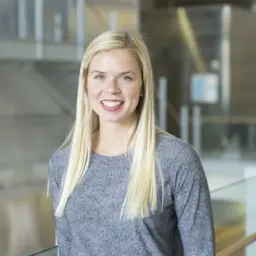Madeline Ford (BSIE ’17) felt confident in her education and skills as an industrial engineer as she perused job listings heading into her senior year. The only problem?
 After completing her Master of Science in Industrial Engineering – Human Factors and Health Systems Engineering, Madeline Ford (BSIE ’17) will join the Johns Hopkins University Applied Physics Lab as a health systems engineer. Photo: Renee Meiller.
After completing her Master of Science in Industrial Engineering – Human Factors and Health Systems Engineering, Madeline Ford (BSIE ’17) will join the Johns Hopkins University Applied Physics Lab as a health systems engineer. Photo: Renee Meiller.
“All the jobs that I knew I wanted, that I felt like I had the skills for, I didn’t have the qualifications for in the education department,” Ford says.
The health systems engineering and hospital process improvement positions she had her eye on required either master’s degrees or nearly a decade of work experience. Luckily for Ford, the Department of Industrial and Systems Engineering had just launched a new one-year master’s program that was an ideal fit for her.
This spring, she is among the first batch of graduates of the department’s two new specialized master’s options in human factors and health systems engineering and systems engineering and analytics.
“These programs build on our current areas of strength and what we are really known for, both in the state of Wisconsin and nationwide,” says Professor Jeffrey Linderoth, ISyE department chair. “We also identified a significant need for training students with a deeper technical background and knowledge in those areas.”
The programs also offer considerable flexibility: Among the 30 required credits, students work with their advisors to find the right blend of classes to suit their career interests—whether that’s working in human-centered design for Apple, for example, or in analytics for a manufacturer.
That kind of pliability has allowed John Sandgren (BSIE ’17) to hone the coding, data analysis and data visualization skills he craved, while also sampling a few healthcare courses. Sandgren, who will graduate from the systems engineering and analytics program, will be working in healthcare consulting for Baker Tilly.
“I thought I could kind of get the best of both worlds,” he says.
For Ford, the program has allowed her to dive deeper into healthcare coursework and learn from the likes of Procter & Gamble Bascom Professor in Total Quality Pascale Carayon, a nationally recognized expert in patient safety and her advisor.
“I was a good industrial engineer from undergrad; we have a great program for that. I was just going deeper,” says Ford, who will join the Johns Hopkins University Applied Physics Lab as a health systems engineer after graduation.
“It just really showed me how I can use all this knowledge that I’ve learned in a practical way while still picking up a deeper understanding and more advanced skills along the way.”